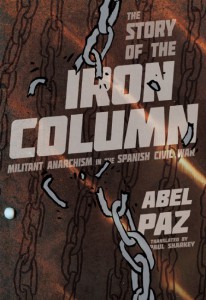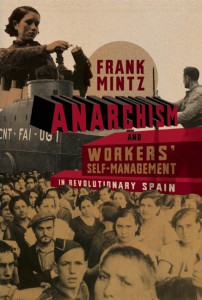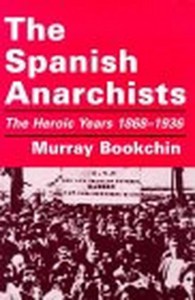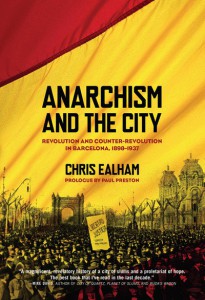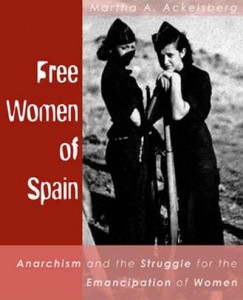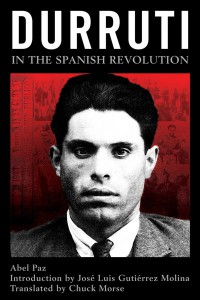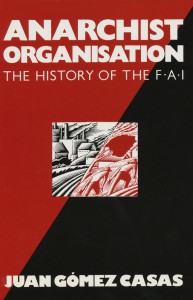Posted on September 24th, 2014 in Events
Reading, and discussion of James Tracy’s Dispatches Against Displacement: Field Notes from San Francisco’s Housing Wars.
A housing activist in the Bay Area since before Google existed, Tracy excavates that history, exploring the battle for urban space—public housing residents fighting austerity, militant housing takeovers, the vagaries of federal and state housing policy, as well as showdowns against gentrification in the Mission District. From these experiences, Dispatches Against Displacement draws out a vision of what alternative urbanism might look like if our cities were developed by and for the people who bring them to life and keep them running.
Learn more about the book: http://www.akpress.org/dispatchesagainstdisplacement.html
Facebook event here: http://www.facebook.com/events/911108038918209/
Posted on September 11th, 2014 in Events
James Tracy will be part of a panel discussing “Homelessness and the lack of Housing for People in Reentry” on Saturday, September 27, 2014.
For more info: http://www.reentryaction.org/conference
Posted on August 13th, 2014 in Events
Potluck, reading, and discussion of James Tracy’s Dispatches Against Displacement: Field Notes from San Francisco’s Housing Wars.
A housing activist in the Bay Area since before Google existed, Tracy excavates that history, exploring the battle for urban space—public housing residents fighting austerity, militant housing takeovers, the vagaries of federal and state housing policy, as well as showdowns against gentrification in the Mission District. From these experiences, Dispatches Against Displacement draws out a vision of what alternative urbanism might look like if our cities were developed by and for the people who bring them to life and keep them running.
Learn more about the book: http://www.akpress.org/dispatchesagainstdisplacement.html
Facebook event here: http://www.facebook.com/events/1462009340740953/
Posted on August 1st, 2014 in Events
We’ll have a table again this year at the Victoria Anarchist Bookfair on unceded Coast Salish Territory. Come by to check out our latest books and participate in the other bookfair events!
Details at: http://victoriaanarchistbookfair.ca/
Posted on August 1st, 2014 in Events
We’re pleased to be taking part in the Radical Bookfair Pavilion again this year! Come by and check out a whole tent of radical books (including lots of ours!), right in the middle of the city’s book festival. Those who have attended before, please note the different location of the Book Festival this year!
More information on the goings-on in the Radical Bookfair Pavilion can be found here: https://redemmas.org/pages/the-2014-radical-bookfair-pavilion-at-the-baltimore-book-festival–2
Don’t miss the AK Press authors speaking at this year’s festival:
Saturday, 9/27 at 6PM: Ryan Conrad on Against Equality: Queer Revolution, Not Mere Inclusion
Sunday, 9/28 at 3PM: Jay Gillen on Educating for Insurgency: The Roles of Young People in Schools of Poverty
Sunday, 9/28 at 5PM: Marshall “Eddie” Conway on Marshall Law: The Life and Times of a Baltimore Black Panther
Posted on August 1st, 2014 in Events
This year Philadelphia is having its first-ever anarchist bookfair and we’ll be there to join in the fun! Come by our tables to say hi and check out the latest books.
Details are at http://phillyanarchistbookfair.wordpress.com/

Posted on August 1st, 2014 in Events
Stop by the AK Press table at the Seattle Anarchist Bookfair, and see all the latest and best titles!
Check out the website at http://seattleanarchistbookfair.net for the most up-to-date information. And don’t miss the discussion of our new book The End of the World As We Know It?
Posted on August 1st, 2014 in Events
We’ll have a table of our new titles and favorites at the Providence Anarchist Bookfair again this year! Stop by and check ’em out.
The bookfair is part of Foo Fest in downtown Providence: http://foofest.as220.org/. Bookfair website with more details hopefully coming soon!
Posted on July 17th, 2014 in About AK, Recommended Reading
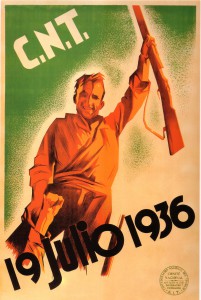 |
On this day in 1936, fascists in Spain launched a coup to topple the country’s Republican government. They got more than they bargained for: within days workers and peasants across the country fought back for a world without government.
This, of course, seems like a good time to share a sampling of the many, many titles we carry that study and celebrate history’s most thoroughgoing anarchist revolution. Let’s start with books:
|
—-
[click on the image to go to a book’s web page]
And here are some pamphlets from the Kate Sharpley Library, which can always be counted on to find untold stories and underrepresented angles on all aspects of anarchist history:
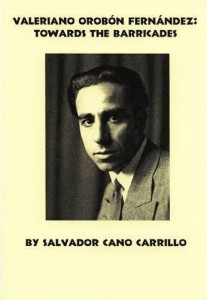 |
Valeriano Orobon Fernandez: Towards the Barricades
Salvador Cano Carrillo |
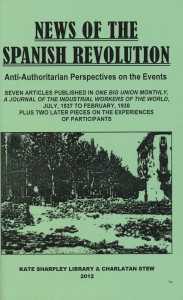 |
News of the Spanish Revolution: Anti-authoritarian Perspectives on the Events
Stew Charlatan |
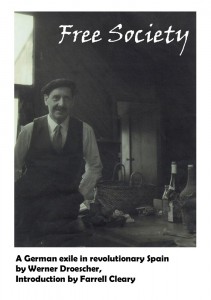 |
Free Society: A German Exile in Revolutionary Spain
Werner Droescher |
 |
Anarchism in Galicia: Organisation, Resistance and Women in the Underground
Eliseo Fernández, Antón Briallos, and Carmen Blanco |
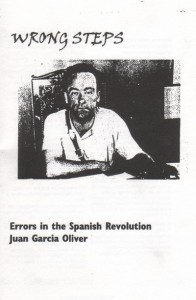 |
Wrong Steps: Errors In The Spanish Revolution
Juan Garcia Oliver |
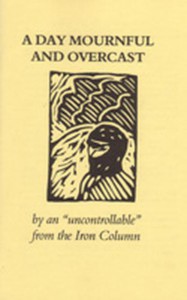 |
A Day Mournful And Overcast
An ‘uncontrollable’ from the Iron Column |
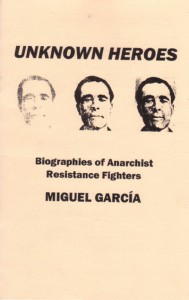 |
Unknown Heroes: Biographies of Anarchist Resistance Fighters
Miguel Garcia |
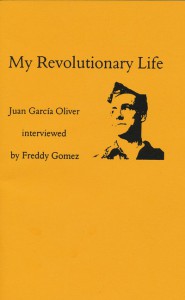 |
My Revolutionary Life
Juan Garcia Oliver interviewed by Freddy Gomez |
Posted on July 3rd, 2014 in Uncategorized
 The New Significance recently posted this nice interview with author Mark Bray about his contribution to the book The End of the World As We Know It?
The New Significance recently posted this nice interview with author Mark Bray about his contribution to the book The End of the World As We Know It?
TNS: Hi Mark, and thanks for taking the time to respond to some questions. Before we begin, can you tell readers a bit about yourself and the various projects you’ve been involved in over the years?
Mark: My pleasure! Well, I’m from New Jersey and I’m a member of the new Black Rose Anarchist Federation, the Industrial Workers of the World (IWW) and a PhD Candidate in Modern European History at Rutgers University. Over the years I’ve been involved in the global justice movement, the anti-war movement, student and immigrants’ rights work, labor organizing, and other campaigns. I was also an organizer with the Press and Direct Action working groups of Occupy Wall Street in New York City. I recently published Translating Anarchy: The Anarchism of Occupy Wall Street about the role of anarchism in the movement based on my experiences and 192 interviews with organizers in NYC.
TNS: In your contribution to The End of the World As We Know It? (AK Press, 2014) you talk about the “strategic presentation” of the politics of Occupy Wall Street that you and others tried to mobilize as organizers within the Press Working Group. Can you describe what you mean by that?
Mark: Essentially the article discusses how organizers involved in framing the politics of Occupy attempted to transcend popular disdain for the words and language of radical left ideology (such as ‘anarchism’ or ‘communism’) while maintaining their anti-capitalist, anti-authoritarian politics and attempting to target the underlying affinity that many Americans feel for the content of anarchist politics when understood without its often cumbersome ideological baggage. In other words, many working class Americans distrust the federal government, reject the notion that politicians are looking out for the interests of everyday people, understand that the banks and corporations have played a destructive role in the economy over the past years, are very sympathetic to the concepts of local autonomy, participatory democracy, etc. but when they’re initially presented as components of ‘anarchism’ or more broadly anti-capitalist politics the conversation often ends there.
So those of us in the Press Working Group, for example, framed talking points and wrote press releases that presented an anti-authoritarian message that focused on issues and values that people already shared in order to get them involved and expose them to opportunities for further radicalization.
TNS: One of the tropes that you point out that is used to justify austerity, in particular, but also capitalism generally is the idea that we need to “live within our means.” This is a genius talking point for liberals and conservatives, who argue for cutting social spending all the while syphoning wealth upwards (indeed, the top 7% of earners actually got richer during the crisis, while the rest of us were told to tighten our belts). But you and the organizers you worked with repurposed this slogan creatively. Can you describe that for us?
Mark: So in the article I focus on four axiomatic, ‘common sense’ political/ethical perspectives that many Americans hold that OWS organizers had a fair amount of success mobilizing in order to redirect away from their reactionary popular usage toward a much more radical direction including: “Shining City Upon a Hill,” “A Fair Day’s Wage for a Fair Day’s Work,” “You Will Always Have the Poor Among You,” and, as you mentioned, “Living Within Your Means.” The right mobilizes around the concept of “Living Within Your Means” in order to capitalize on the commonly held belief that individuals and families should balance their budgets and apply that adage to the affairs of state thereby glossing over the vast differences that separate the two examples. This rhetoric has the effect of silencing protest because it makes people think that their sacrifices are shared across class and strengthen their character.
But Occupy organizers continually emphasized that the ruling class was not enduring any sacrifices, despite the fact that they were to blame for the crisis, while working people suffered although they ‘played by the rules.’ So, as the well-used Occupy slogan went, “Banks got bailed out/We got sold out.” The financial institutions got rewarded for living beyond their means while working people got punished for living within them.
So the potential strength of these kinds of arguments is that they start with already shared premises to demonstrate how the rich habitually thumb their nose at them.
TNS: It was also interesting that you note that the term “austerity” never really gained traction in the US, particularly in press reporting on the economic situation after the market collapse. This is fascinating for a couple of reasons, not least of which is that the US has definitely seen similar trends as Europe, where “austerity” is a common signifier for a certain set of political priorities (i.e. state-sponsored supply-side economics, where wealthy elites are given massive amounts of tax dollars because their operations are deemed “too big to fail”; funding for those bailouts provided by the evisceration of social spending and the repurposing of those dollars as handouts to the rich; etc.). Why do you think the terminology never took hold in the States?
Mark: Yeah, definitely. Well I’m not entirely sure, but I think a part of it has to do with a well-orchestrated effort to drain the financial crisis of any historical context and portray the issues it raised as essentially eternal questions of the role of government in the economy. The politicians and talking heads present the issue as a continual tug of war between liberals and conservatives over how much the government should ‘interfere’ with the free market. From their perspective, this struggle sometimes sways one way, sometimes another, but it transcends historical eras. Therefore, this outlook is at odds with the more historical interpretation of the recent crisis having ushered in an era of austerity that, to one extent or another, has affected many different governments around the world especially in the global north.
Therefore, government cuts are portrayed as victories for the right in this morally charged battle rather than concessions to a broader historical ‘mandate’ to cut back on social services. Also ‘austerity’ is just not a well known word in the United States, relative to many other places, so that may have something to do with it also.
TNS: And would you mind telling us a bit about your recent book, Translating Anarchy: The Anarchism of Occupy Wall Street? You catalogue some of these issues in the book, correct?
Mark: Yes, Translating Anarchy is a political analysis of the organizers of Occupy Wall Street in New York City based on 192 interviews with organizers and my own experience. Based on the interviews I document the fact that approximately 72% of organizers had explicitly anarchist or implicitly anarchistic politics despite the mainstream media claim that Occupy was a liberal movement whose aspirations were limited to reforms such as campaign finance reform or a millionaire’s tax.
So the book documents this contrast between the anti-capitalist, anti-authoritarian organizers that made the movement happen and the larger liberal base of support that generated so much hype for Occupy with a focus on how the radicals at the core of the movement managed to bring people into the movement by orienting their radicalism in accessible language. Ultimately Occupy Wall Street was successful because it brought together this revolutionary core with a liberal support base, and so moving forward those of us serious about transforming society need to put more effort into promoting our ideas outside of left circles. Translating Anarchy reflects on the successes and failures of that project in New York and situates Occupy within a larger historical context of previous social movements and revolutionary struggles.




